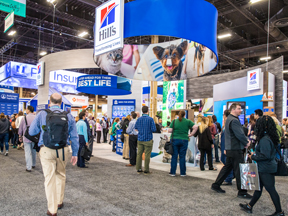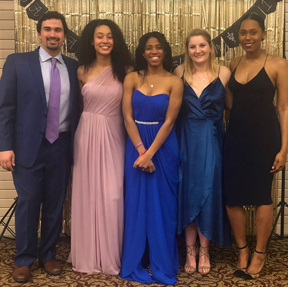!This story has an important update
WVC expo

Photo by Tonya Harvey/Viticus Group
The exhibition floor of a veterinary conference is often a hive of activity, like this scene from the Western Veterinary Conference in Las Vegas in February. Because of the COVID-19 pandemic, WVC has postponed its 2021 meeting until next fall.
The VMX Veterinary Meeting and Expo, the largest veterinary meeting by attendance in the world, is slated in early 2021 to be the profession's first in-person conference in the U.S. since March, when COVID-19 was declared a pandemic.
At least one other in-person conference is planned for the first quarter of 2021: The World Small Animal Veterinary Association (WSAVA) Congress is on the books for March in Warsaw, Poland. Originally scheduled to take place last month, the meeting was postponed by six months because of the public health crisis. Both WSAVA and VMX, which takes place in Orlando, Florida, are also offfering online versions of their conferences.
VMX and WSAVA announced their plans this summer, as COVID-19 case numbers declined in the U.S. and Europe, following the outbreak's first peak. Those trends have since reversed. Case numbers are rising rapidly in Midwestern and Rocky Mountain states, as well as in parts of Europe, South America, India and Russia.
Asked whether plans could change as case numbers climb, a spokesperson for the North American Veterinary Community, which runs VMX, said the group is "constantly" monitoring COVID-19 developments. "At this time, our plans are to host a hybrid event in January," Robin Pence said by email.
This year's four-day meeting drew 18,000 people and ended in late January, before COVID-19 was recognized as a pandemic.
Large indoor gatherings are considered to pose a high risk of spreading the highly contagious coronavirus that causes COVID-19. Consequently, organizers of other conferences scheduled early next year are taking a more conservative approach. The British Small Animal Veterinary Association Congress and the Association of American Veterinary Medical Colleges Annual Conference, both in March, will be online only. The Western Veterinary Conference (WVC), originally slated for February, has been delayed until September.
Dr. Anthony Pease, chief veterinary medical officer of Viticus Group, which runs WVC, told the VIN News Service by email that the most important factor in its decision to postpone was the safety of attendees, speakers and exhibitors. "With an unknown timeframe of the distribution of a COVID-19 vaccine as well as the outbreaks in universities as students come back in the winter, postponing the event until September allows more time to control the pandemic and for states to allow large in-person events," Pease said.
WVC attracted 16,000 attendees in February, and was one of the last big in-person veterinary meetings before restrictions shuttered the show circuit.
What the community wants
Several conference organizers said survey results and other forms of member feedback influenced decisions on how and when to meet.
Viticus Group said it polled more than 1,000 veterinary professionals to ask when they'd feel comfortable traveling to Las Vegas for the 2021 WVC conference.
"A majority of responses indicated that the preference was sometime after the spring of 2021, with about 30% saying they'd prefer the fall," Pease said. "With a large number of our partners also having travel restrictions in the early part of 2021, we wanted to make sure we can have an event that continues to bring the industry leaders and speakers that people expect at our conferences."
Surveys conducted by VMX yielded different results.
"The majority wanted to attend live," NAVC CEO Gene O'Neill said last month during a podcast about the impact of COVID-19 on VMX planning.
VMX reports that registrations for the 2021 event are at about the same level as they were for 2020 at the same time in the registration process. Pence said a "strong majority" of registrants are opting for the in-person event. She did not provide a specific percentage.
A five-day pass for veterinarians who register before Oct. 26 is $625, and covers both in-person and virtual access to VMX. After Oct. 26, the price jumps to $825. Owing to pandemic-related uncertainties, such as travel restrictions, VMX is lenient on cancellations this year, O'Neill said.
"We are not going to penalize anyone for wanting to attend live and then not being able to," he said in the podcast.
According to the cancellation policy posted on the NAVC website, registrants who decide not to attend the live event before Nov. 30 can receive a refund minus a $65 fee. After Dec. 1, there is no refund.
In addition, if VMX cancels the in-person event, registrants will automatically be signed up for the virtual event, which costs $495, and receive a refund for the difference in fees. VMX does not specify a policy for attendees who might not want to participate virtually.
For the in-person event, VMX and the Orlando County Convention Center are promoting an array of health and safety guidelines and protocols aimed at reducing the spread of the virus at the event. These include social distancing measures such as one-way traffic flow and wider aisles in the expo hall and a 50% capacity in meeting rooms; requiring masks indoors; stepped-up cleaning and disinfecting, including deploying ultraviolet irradiation in high-touch, high-congestion areas; temperature checks at entrances; and a medical concierge program offering access to a physician and COVID-19 testing, for a fee.
The convention center has received accreditation for its outbreak prevention, response and recovery protocols from the Global Biorisk Advisory Council, a division of ISSA, an international cleaning industry association. Approximately 75 facilities around the world, including stadiums, hotels and airports are accredited.
Weighing risk against commitment
Dr. Alice Villalobos, president for the Society of Veterinary Medical Ethics (SVME), is scheduled to attend VMX to moderate a series of presentations entitled Ethical Perspectives on Euthanasia. "I've been two-stepping all along," she said, making plans for all-online presentations in case VMX cancels the in-person event at the last minute.
The presentation is two years in the making, with ideas and input from many clinicians and ethicists. It will include a keynote by Temple Grandin, a professor of animal science at Colorado State University and an authority on the humane treatment of livestock; and explore issues related to euthanasia of farm animals, dysthanasia (death marked by unnecessary suffering), economic and shelter euthanasia and more.
Villalobos said she feels driven to attend in person because she believes the program is important for the profession. "Even though I know we are conflicted about the whole circumstances with COVID and meetings being considered at risk," she said, "I feel like I have an obligation to the Society."
She said she'll wear a mask and avoid touching surfaces in public. She plans to avoid indoor restaurants, pack simple breakfasts and otherwise rely on room service. SVME board members attending VMX won't meet in person. Rather, the group will meet virtually ahead of the event.
Asked whether holding a meeting in person during a pandemic is ethical, Villalobos replied that offering a choice is the critical issue; no one who is uncomfortable with a live gathering should be required to attend.
She added that if anyone has an ethical problem, "It's people who don't choose to wear masks."
'Stewards of public health'
SAVMA Symposium 2019

Photo courtesy of Laci Taylor
Live conferences give participants a chance to dress up and socialize, as well as network and learn. Shown attending the 2019 SAVMA Symposium opening ceremony are veterinary students (from left) Xanth El-Sayed, Chanera Peck, Morganne Campbell, Jillian Yant and Laci Taylor. 2021 is the second year that students will forgo gathering in person due to the pandemic.
Among those who have felt the weight of responsibility that falls on conference organizers in the middle of a pandemic are the young people who put together the annual Student American Veterinary Medical Association (SAVMA) symposium. On top of their demanding school schedules, student volunteers plan the days-long event, which includes interactive lectures, wet labs, and academic and athletic competitions.
In March, days before the 2020 symposium was to take place at Cornell University College of Veterinary Medicine, organizers were told the college was canceling the event.
"We were all devastated — I mean, a-room-full-of-tears devastated," said Laci Taylor, a third-year veterinary student at Cornell. She and fellow organizing committee members had planned the gathering for two years. "It took a lot to accept the fact that we would not get the chance to see all of the hard work we put in come to life," Taylor said, "but we knew that as veterinary students and stewards of public health, it was the right thing to do."
With more time to plan for vagaries of the pandemic, SAVMA will take its annual meeting online for the first time in the show's history. The 2021 SAVMA Symposium is to be held virtually March 13-15, hosted by Kansas State University.
Mixed plans across the pond
BSAVA CEO Amanda Stranack cited the challenges of safely hosting a large group meeting combined with unknowns associated with the virus as reasons for the decision to go remote. "We felt our members needed certainty. And if we are to invest our energy in creating something that was the best it could be, then a virtual event was the way to ensure that," she told VIN News by email.
She added that the virtual congress will be "completely different" from this year's quick-response effort. "We are working to make next year's event as close to a real live event as we can, with fully interactive sessions, opportunity to browse the exhibition, network and ‘meet up' with old friends and all the great stuff you can do at a live event," she said.
The meeting will be held March 25-27. That's the same week the delayed 2020 WSAVA Congress will open in Warsaw.
During a series of virtual meetings during the year, WSAVA representatives asked what members wanted for their annual congress. "Many said that while they were very happy to meet online, they are feeling more isolated than usual and miss the interaction and friendly face chats with their global colleagues …" outgoing president Ryan said in an email to VIN News.
"Given the pandemic, we are expecting around 1,500 face-to-face delegates, the majority from Poland and other Eastern European countries," Ryan said. Usually around 3,000 people attend the meeting.
WSAVA will also offer the meeting on a digital platform so a global audience can attend; selected streams will be available in Spanish and Chinese. "[T]his actually represents an amazing opportunity to connect our community in a way never before possible," he added.
The Polish government has stated that it will not introduce a second lockdown or close borders in response to the pandemic. However, flights from some countries, including the U.S., currently are banned.
An Oct. 19 update on the VisitKrakow.com website warned: "The number of new daily cases in Poland took another big jump last week and reached a record peak of 9622. Numbers have been doubling on a near-weekly basis and this is significantly higher than at any point during the pandemic. We advise at-risk travellers to stay away."
Euronews reported this week that Poland's government is transforming the National Stadium in Warsaw into a temporary field hospital for surging numbers of COVID-19 patients.
Owing to the pandemic-scrambled calendar, WSAVA will end up having two meetings in 2021. Its official 2021 congress is scheduled for November in Hyderabad, India.
Update: NAVC announced on Nov. 9 that it is rescheduling the VMX conference to June 5-9, 2021, owing to ongoing impediments to travel, as cases of COVID-19 rise around the country and beyond.